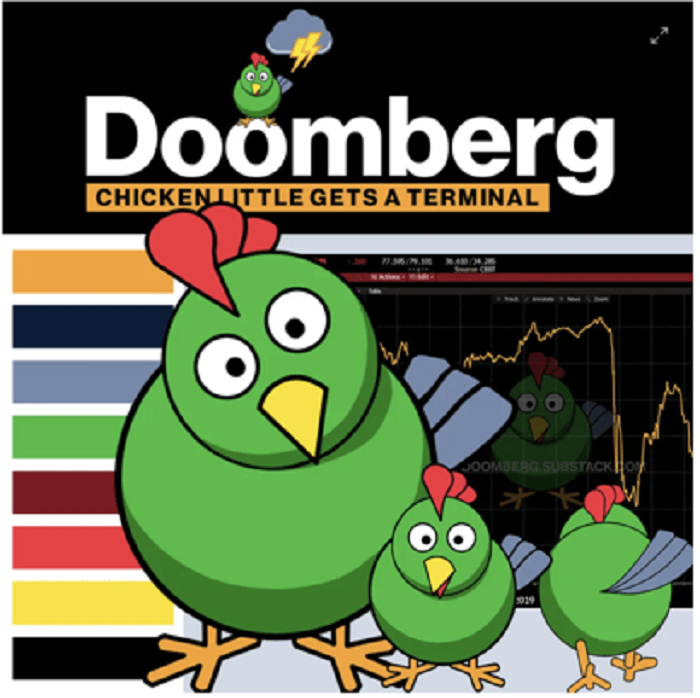Doomberg is one of the most widely read financial Substacks currently available. Some might be familiar with the below graphic of the Green Chicken.
Figure 1: Doomberg’s Green Chicken

Source: https://doomberg.substack.com/p/the-year-of-the-chicken?s=w
On 4 August 2023, we were able to have a wide-ranging conversation about some of their most recent publications.
What is Doomberg’s current ‘hot take’?
We started the conversation asking Doomberg what, in their opinion, is their most controversial opinion published today. They answered clearly that they believe the evidence and the science tells them that there is no realistic path to decarbonise the global economy fully through renewables. They indicate that they get to this conclusion from a physics perspective, and that weather-dependent renewables (wind and solar primarily) will always be tough.
Their bottom-line point is that, if societies are faced with the option of either changing their standard of living or burning fossil fuels for energy, fossil fuels will be burned.
Is decarbonisation possible?
However, Doomberg made clear in the discussion that if the goal is decarbonisation, this is absolutely possible. They believe that the primary path to get it done is through nuclear energy. It is their opinion that nuclear is associated with certain irrational fears, and that the general population has lost faith in the technology. However, many countries are progressing their nuclear power assets. Doomberg cited that China is doing a lot of building, but gave the greatest kudos to Ontario, Canada.
Doomberg told the story of how Ontario had been progressing down a certain path with a goal of decarbonisation, but it ultimately did not work and the citizens used their voting and election process to bring in a new government and set a new energy agenda. Ontario now has a very clean, very reliable and very economic grid, and they are getting this done through an application of nuclear power.
‘Policy can stay inefficient longer than you can stay solvent’
This was an interesting spin on the very familiar quotation from Lord John Maynard Keynes, ‘Markets can stay irrational longer than you can stay solvent.’ Doomberg mentioned it while discussing their view on the Inflation Reduction Act (IRA).
Whilst Doomberg does not believe in a decarbonised future based solely on weather-reliant renewables (like wind and solar), it does believe that a lot of money is going to be thrown in that direction. Doomberg explained how they might seek to invest in such a scenario:
- Certain things will be promoted: Doomberg cited an example of lithium miners. It is obvious that if we are going to electrify many things, like vehicles, we need a lot more lithium. Money will be directed towards lithium miners. However, Doomberg cites that timing will be important in such trades because technology’s advance could actually drive lithium’s price down and make it tough for these types of stocks to make money in the long run.
- Certain things will help to enable: it might be less risky, in Doomberg’s opinion, to focus on technologies that enable lithium miners to do the mining. This is similar to what many term a ‘picks & shovels’ approach where, during the California gold rush, there was the concept that supplying the miners with tools was a lower risk way to make a profit than actually depending on finding gold.
- Certain technologies will be contrarian: some investors in various locations around the world might opt to invest in fossil fuel companies. This could seem contradictory— isn’t the world trying to decarbonise? However, we saw in 2022 that, when geopolitical tensions rose in the Russia/Ukraine conflict, natural gas and coal did, in fact, see sources of demand.
Gold, bitcoin or fiat?
Doomberg was very clear that we currently live in a fiat world, but recognised some of the inherent benefits that gold and bitcoin can bring compared to fiat currency. The focus of the discussion tended toward these hard assets having characteristics that could help in hedging an environment of monetary debasement, with a sensitivity to history of government action—namely when Canada basically outlawed bitcoin during certain recent protests or when the US did in fact outlaw the holding of physical gold by private citizens. Doomberg stated multiple times that we ultimately live in a world where money is what the government says it is.
We would like to thank Doomberg for joining us on the show, and we note that the full episode can be listened to here.

